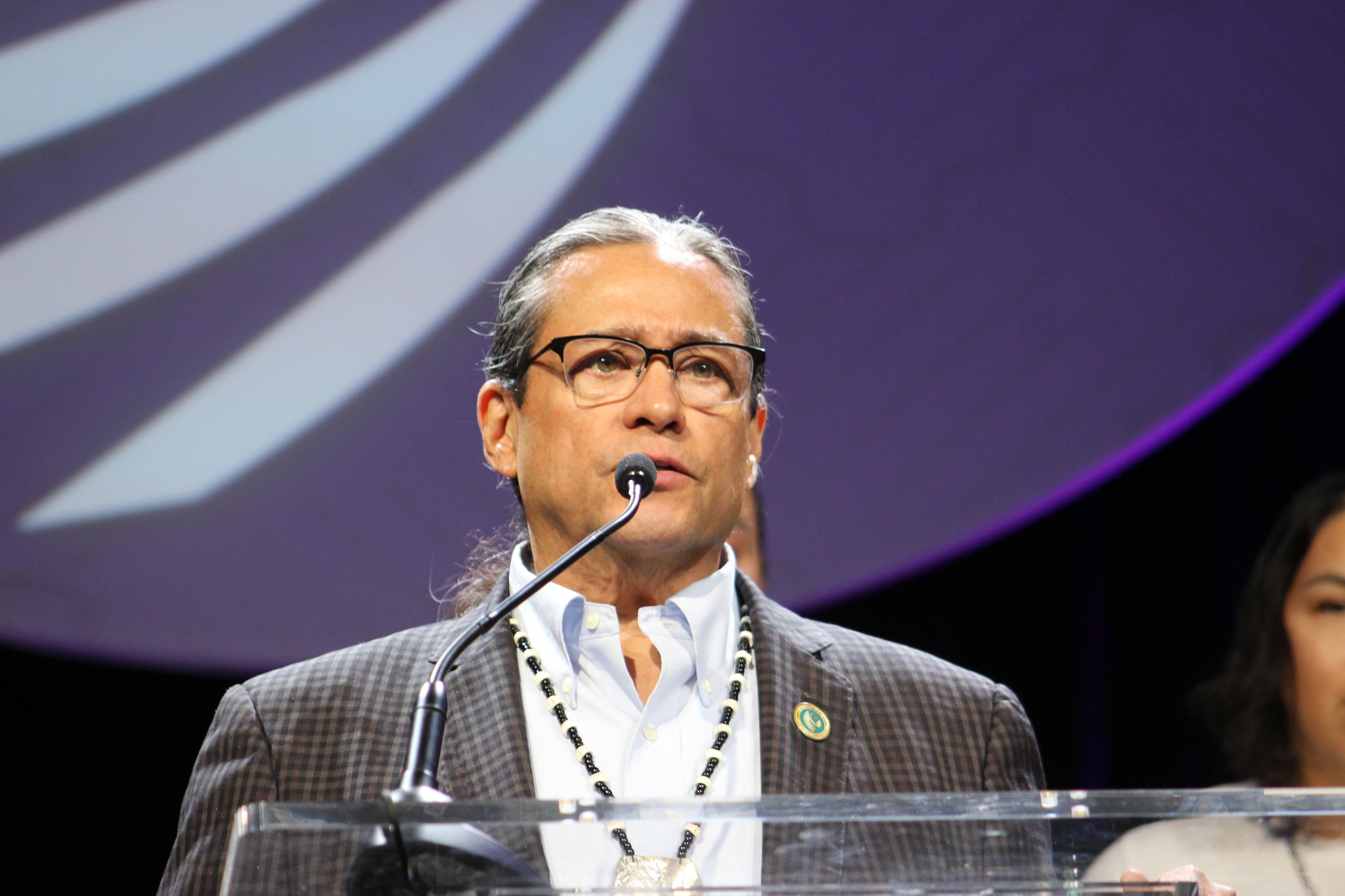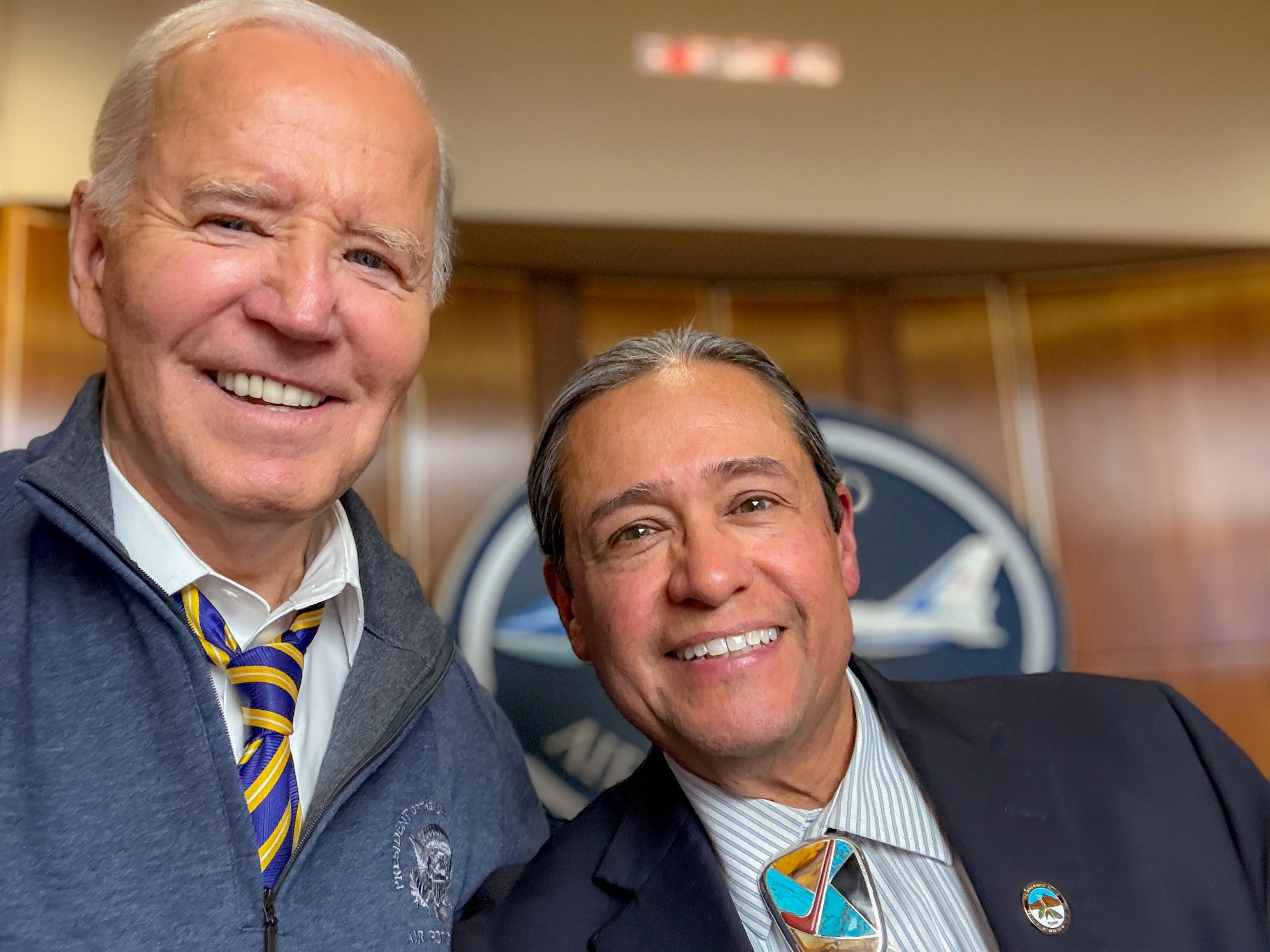
- Details
- By Levi Rickert
SEATTLE — It took two rounds of voting, but in the end, the National Congress of American Indians (NCAI) re-elected Mark Macarro to serve as president of the oldest and largest Native American organization on Thursday.
First elected the 24th president of NCAI in November 2023 at the organization’s annual convention in New Orleans, Macarro beat two other candidates who vied for the presidency: Jacqueline Pata (Tlingit and Haida Indian Tribes of Alaska) and Nez Perce Chairman Shannon Wheeler.
During the first round of voting, Macarro garnered 49 percent of the vote to 33 percent for Pata and 18 percent for Wheeler.
Macarro won a majority in the second round of voting against Pata with 60 percent of the votes cast by NCAI delegates.
Macarro is the longtime tribal chairman of the Pechanga Band of Luiseño Indians in Southern California. He was first elected to the Pechanga Tribal Council in 1992 and has served in leadership ever since, guiding the tribe with a vision of strengthening political self-determination, tribal sovereignty, and economic self-sufficiency — all while preserving Pechanga’s distinct cultural identity.
A graduate of the University of California, Santa Barbara, Macarro has served on the boards of the Indian Gaming Association, the Native American Rights Fund, and California’s Truth and Healing Council.
During a ride on Air Force One in October 2024, Macarro spoke with President Joe Biden about granting clemency for Leonard Peltier (Turtle Mountain Ojibwe), a member of the American Indian Movement (AIM) who is serving two consecutive life sentences for his conviction in the 1975 killing of two FBI agents, Jack R. Coler and Ronald A. Williams, on the Pine Ridge Indian Reservation.

At the time, Biden was noncommittal about any action he would take on behalf of Peltier but thanked Macarro for raising the case.
As a result of Macarro’s advocacy and bringing the case directly to the president of the United States, Biden commuted Peltier’s sentence to home confinement just before leaving office. Peltier was released from federal prison in February and now lives on the Turtle Mountain Indian Reservation in North Dakota.
The National Congress of American Indians, founded in 1944, is the oldest and largest organization representing American Indian and Alaska Native tribal governments. Based in Washington, D.C., NCAI advocates for the protection of tribal sovereignty, treaty rights, and federal trust responsibilities while advancing policies that support the health, safety and well-being of Native peoples. The organization serves as a unified voice for hundreds of tribal nations and works with federal agencies, Congress and the White House to address issues ranging from economic development and public safety to education, health care and cultural preservation.
In a speech to the NCAI general assembly on Wednesday, Macarro said he is committed to steady leadership.
“I am committed to respectful nation-to-nation engagement, and I am committed to ensuring that NCAI remains the strong, unified voice that Indian Country deserves,” Macarro said.
More Stories Like This
Navajo Council Committees Tackle Grazing Enforcement, Code RevisionsU.S. Must Fulfill Obligations by Protecting Programs
50 Years of Self-Determination: How a Landmark Act Empowered Tribal Sovereignty and Transformed Federal-Tribal Relations
Trump Veto Stalls Effort to Expand Miccosukee Tribal Lands
Oneida Nation Responds to Discovery Its Subsidiary Was Awarded $6 Million ICE Contracts
Help us defend tribal sovereignty.
At Native News Online, our mission is rooted in telling the stories that strengthen sovereignty and uplift Indigenous voices — not just at year’s end, but every single day.
Because of your generosity last year, we were able to keep our reporters on the ground in tribal communities, at national gatherings and in the halls of Congress — covering the issues that matter most to Indian Country: sovereignty, culture, education, health and economic opportunity.
That support sustained us through a tough year in 2025. Now, as we look to the year ahead, we need your help right now to ensure warrior journalism remains strong — reporting that defends tribal sovereignty, amplifies Native truth, and holds power accountable.
 The stakes couldn't be higher. Your support keeps Native voices heard, Native stories told and Native sovereignty defended.
The stakes couldn't be higher. Your support keeps Native voices heard, Native stories told and Native sovereignty defended.
Stand with Warrior Journalism today.
Levi Rickert (Potawatomi), Editor & Publisher


